
Sask. premier says thousands more may need to evacuate in coming days
More than 9,000 people have now been evacuated from northern Saskatchewan due to wildfires, and Premier Scott Moe said that number could reach 15,000 in the coming days.
"I've never seen anything like it," said Moe, who grew up in and lives in Shellbrook, 44 kilometres west of Prince Albert, near the fires.
DON'T MISS: The Weather Network's wildfire hub
"In the way of the ferocity of the fires, how quickly they're moving, how they're changing and encroaching on communities."
As of Tuesday afternoon, there were 21 active wildfires in the province, eight of which were not contained, according to the Saskatchewan Public Safety Agency (SPSA).
"It hasn't rained this spring in the north. Things are tinder dry and the wind continues to blow each and every day and every few days it shifts direction and threatens a community in a different way or threatens a new community," Moe said.

Saskatchewan fire boundaries. Canadian Wildland Fire Information System (Graeme Bruce/CBC)
The Resort Village of Candle Lake declared a state of emergency Tuesday as the Shoe fire, the largest in the province at more than 407,000 hectares came within 14 kilometres of the community. A voluntary evacuation notice remains in effect.
'It felt like out of the blue'
Brooke Kindel thought she was leaving her home in Denare Beach, Sask., last week as a precaution.
She packed some clothes for her two children after a mandatory evacuation order went out, but never thought fire would reach her home.
"It felt like out of the blue. We thought the fire was fine. We were in our driveway getting our boat ready to go out on the lake because we thought everything was fine."
On Monday, Kindel and her neighbours connected through a Facebook page and watched door camera footage of fire engulfing home after home on her street. The footage confirmed what everyone already knew: their community was gone.
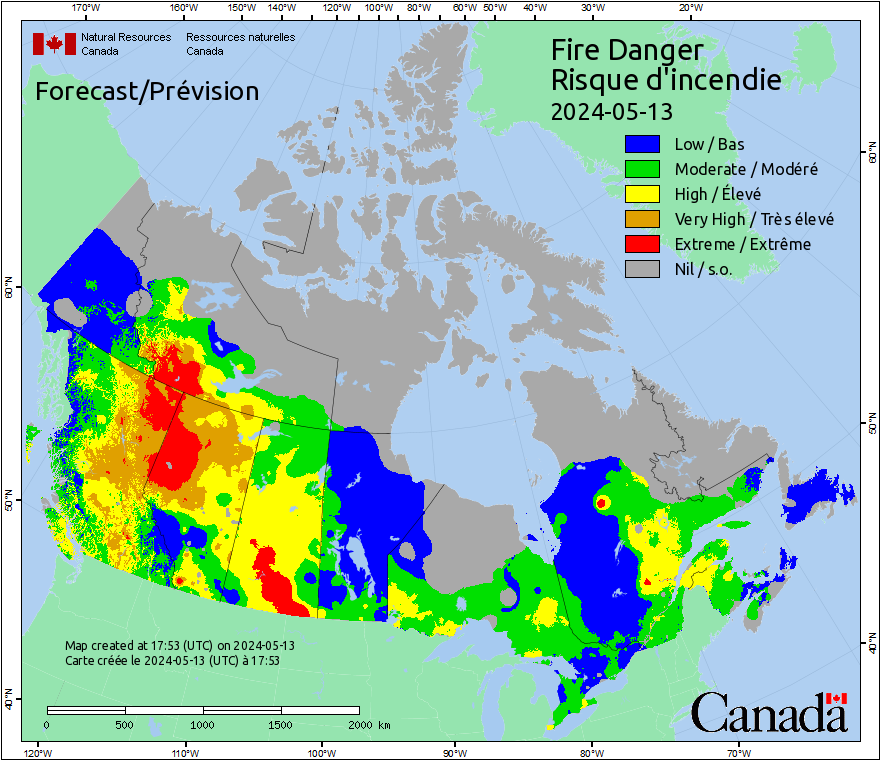
Kindel said her home was the final one standing. Her neighbours watched with her as the temperature climbed in her Tesla car. Kindel said the car, which was left behind, recorded the outside temperature and they were able track the fire's progress as the car got hotter and hotter.
"We lost power for about 20 minutes before my car exploded," she said.
"That pretty much confirmed that everything in our yard was gone."
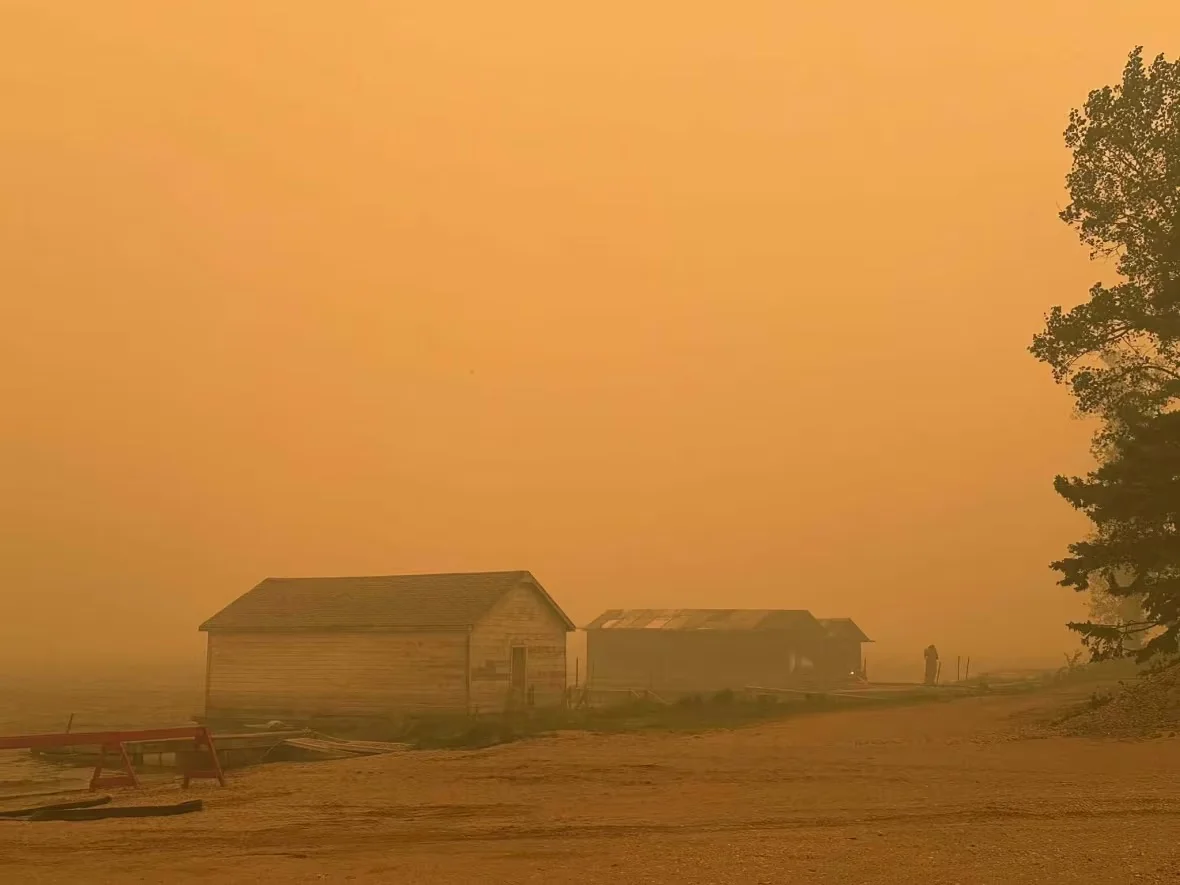
Smoke darkens the sky around Denare Beach, Sask. (Paul Rossington)
Kindel, who is 35 weeks pregnant, left her home last week with her mom and her two young children within two hours of the evacuation order. They drove through the night to Hudson Bay, leaving her husband and father behind to fight the fires.
"All of our neighbours were outside, everyone was saying 'where are you going, where are you going?'" she said.
"Everyone was carrying picture frames and stuff out of their houses and no one knew what to do."
Kindel's husband joined them at a family member's home in Saskatoon after she went into pre-term labour, something Kindel attributed to stress.
Her father left Creighton, where he went during the evacuation, after it became clear the town was gone.
"He was sitting there listening to the radio and when he heard that it took our street, he just decided to leave," Kindel said.
"There was nothing more than he could do for our town."
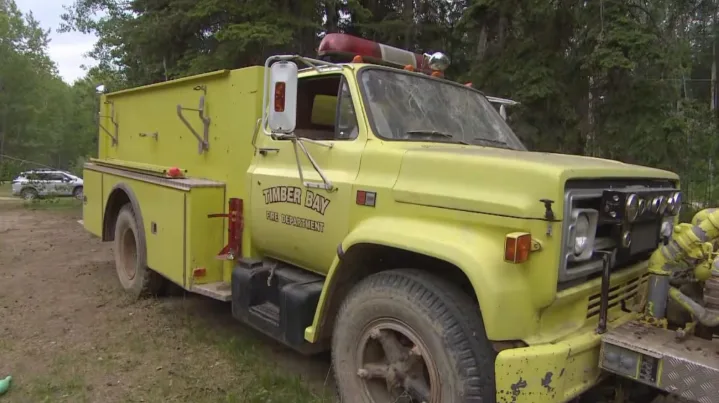
The only fire truck in Timber Bay doesn't work, says Carl Hennie, a volunteer firefighter. The Northern Hamlet of Timber Bay was ordered to evacuate Sunday morning. (Alexandre Silberman/CBC)
Evacuation order
The final remaining firefighters and all essential staff were evacuated from Denare Beach on Monday after intense winds fuelled the Wolf Fire, threatening the town and anyone left in it.
A Facebook post from the Northern Village of Denare Beach Tuesday morning confirmed that everything south of 9th Avenue to the reserve was destroyed by fire.
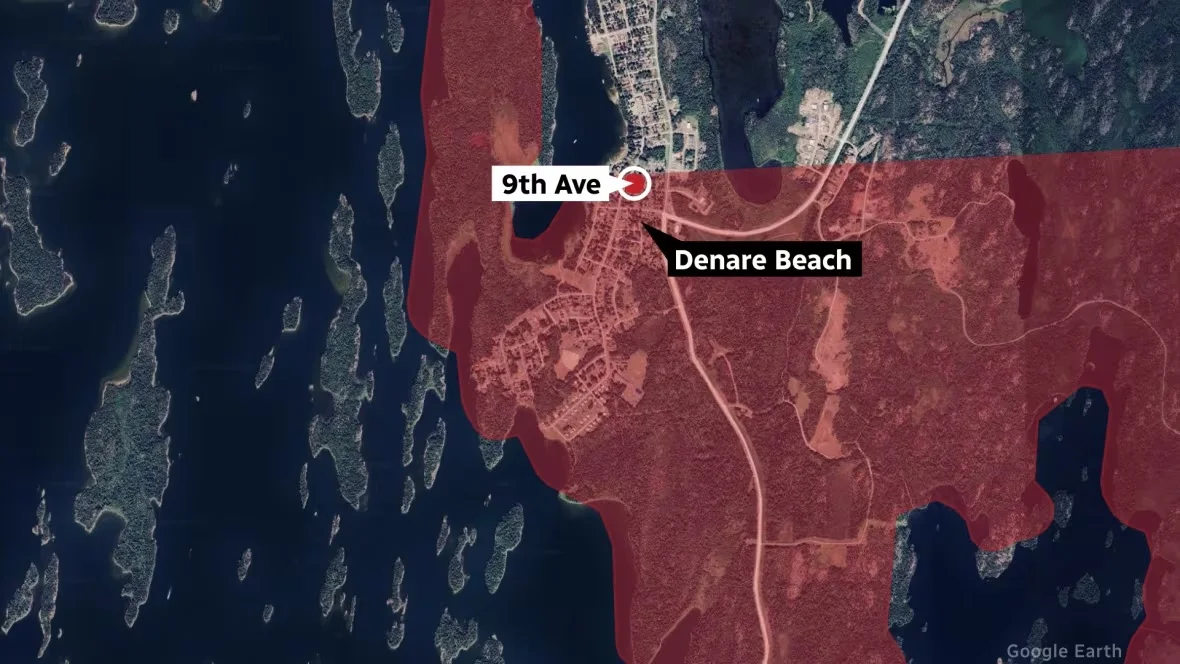
According to the village, Ninth Avenue south to the reserve has been 'devastated.' (CBC)
Cell and internet service is offline, and phone lines are also down, according to a post on the village's Facebook page.
The latest report from the village, which is home to about 699 people according to the latest Census in 2021, said the fire hall, administration building and Denareplex were still standing.
"We understand not receiving further information is frustrating, but please understand we feel as shocked, helpless as you all right now and are trying to navigate the situation as best we can remotely," the Facebook post said.
The same post went on to confirm that members of the village's fire department had escaped and were in Creighton about 19 kilometres away.
RELATED: 'This is classic climate change': Sask. faces worst wildfire season in decades
Steve Roberts, SPSA vide president of operations, confirmed there is significant damage to the community.
"The Wolf fire west of Denare Beach is now no longer west of Denare Beach. It has gone through Denare Beach and is now currently in Manitoba."
Fleeing La Ronge
Everyone living within a 20-kilometre-radius of La Ronge, Air Ronge and the Lac La Ronge Reserve were told to evacuate the area immediately Monday as a fast-moving fire moved in.
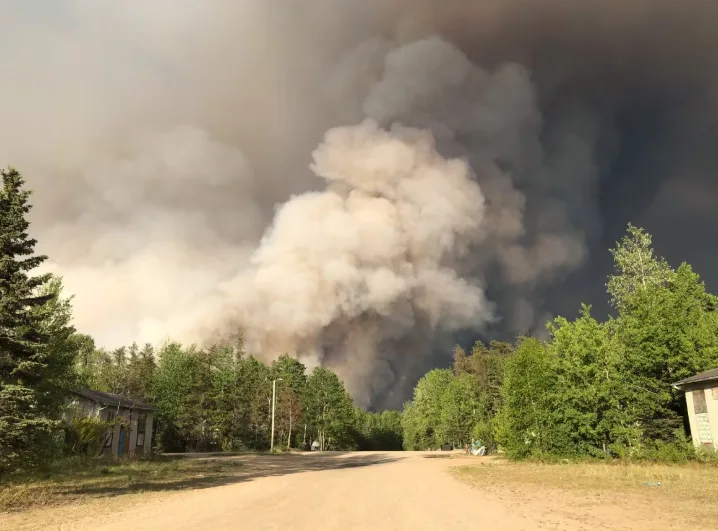
Lisa Powder says it's scary being evacuated from her community of Weyakin. (Submitted to CBC News by Lisa Powder)
That included hospital and long-term care patients, who were moved in buses and ambulances out of town after smoke and fire threatened the airport, making evacuation by air impossible.
The SPSA confirmed fire destroyed its air tanker base at the LaRonge airport, but said it didn't lose any aircraft or warehouses.
According to Saskatchewan Health Authority chief operating officer Derek Miller, 53 patients were taken to a staging centre at Elk Ridge then moved out to 19 different health centres across the province "under intense circumstances."
"There were periods of time where there was heavy smoke and roads were closed periodically."
The La Ronge Health Centre and emergency department are now closed, but five doctors and several nurses remained and will provide emergency health care from the EMS base.
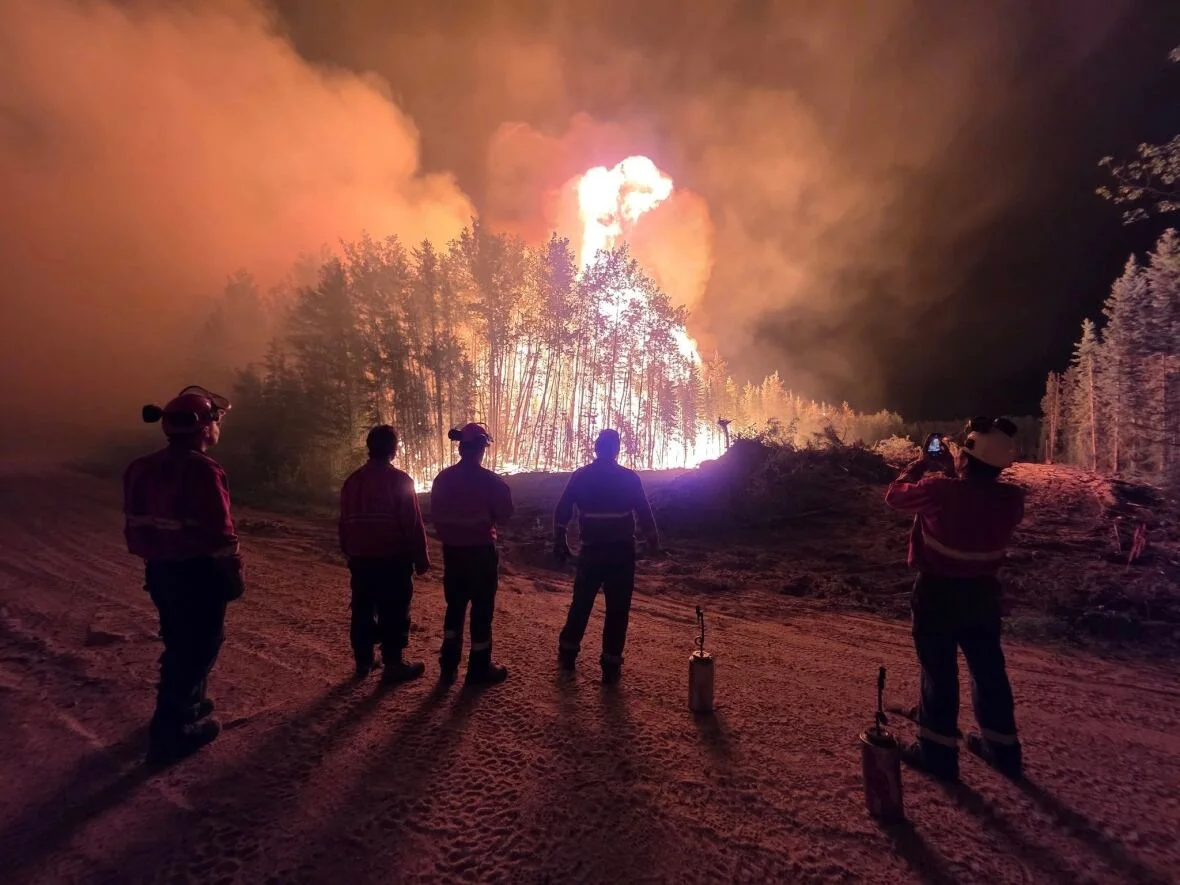
Firefighters near Weyakwin, Sask., observe a back burn meant to help remove fuel for encroaching wildfires. La Ronge is one of many communities in northern Saskatchewan under evacuation orders. (Submitted by Jarret Nelson)
Tom Roberts, the former host of CBC's Keewatin Country, was also trying to leave La Ronge Monday.
He had already fuelled up his cars anticipating the evacuation order, and headed out of town with his daughter, wife and grandson late in the afternoon.
"There were lineups and lineups of people at all the gas stations in La Ronge. It was actually quite a scary thing," Roberts told CBC's Morning Edition.
He got 40 kilometres south when he was stopped by RCMP and firefighters.
"We sat there for two hours waiting for an opening in the fire. The fire was going just all over the road just south of there."
Roberts said there were about 40 vehicles ahead of him and 40 behind, waiting for a break in the fire to start driving away from La Ronge.
At one point, the smoke was so thick he couldn't tell where he was, but kept remembering what the firefighters and RCMP had told him: "Don't stop, just keep going."
"I was a little worried there for a while and scared of course. There's fire on both sides of the road. I couldn't even see the highway line or anything for a few seconds," Roberts said.
Eventually the smoke cleared enough that Roberts and his wife, who was following in her vehicle, were able to see enough to make it safely out.
"It seemed like a lifetime."
Saskatchewan communities now under evacuation order or pre-evacuation alert:
Air Ronge
Brabant Lake
Candle Lake resort village (voluntary)
Clam Crossing
Creighton
Denare Beach
Eagle Point
East Trout Lake
English Bay
Foran Mine - McIlveena Bay
Hall Lake
Jan Lake
La Ronge
Lac La Ronge Indian Reservation
Little Bear Lake
Lower Fishing Lake
Molanosa
Narrow Hills Provincial Park
Nemeiben Subdivision
Pelican Narrows
Piprell Lake
Potato Lake
Resort Subdivision of Ramsey Bay
Sikachu
Sturgeon Landing
Sturgeon Weir.
Sucker River
Timber Bay
Wadin Bay
Weyakwin
Whiteswan/Whelan Bay
This article was originally written by Colleen Silverthorn and published for CBC News on June 3, 2025. It contains files from Alexandre Silberman.
Thumbnail image credit to Jarret Nelson via CBC News.